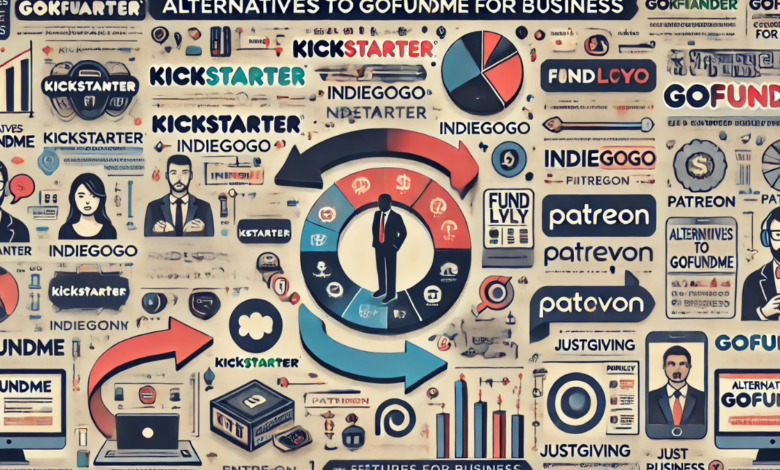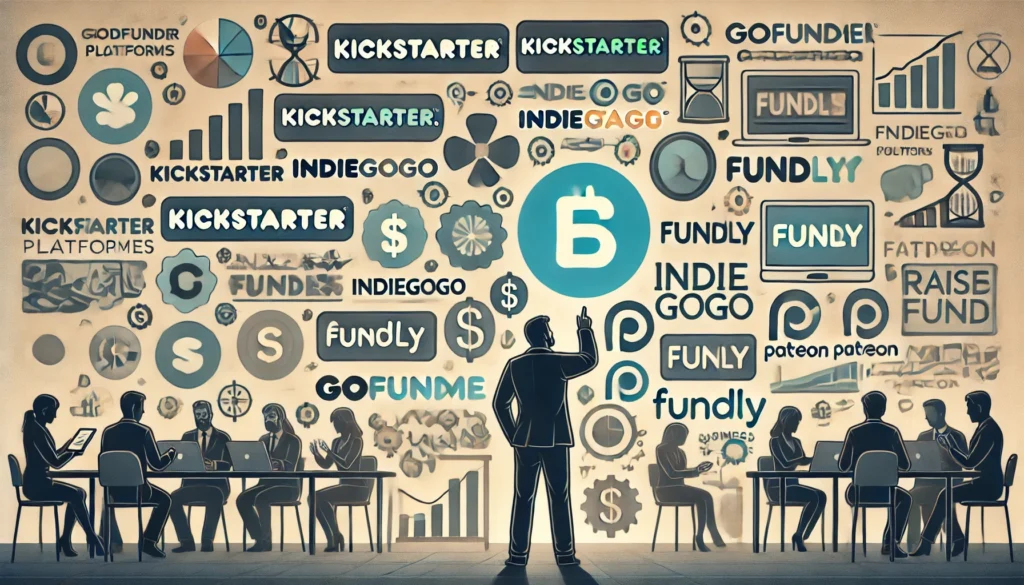Alternative to GoFundMe: Exploring the Best Fundraising Platforms for Your Cause

Alternative to gofundme has revolutionized how individuals and organizations raise money for various causes. Alternative to GoFundMe platforms offer excellent fundraising opportunities for personal, creative, or charitable causes. GoFundMe has long been a leader in crowdfunding, but there are other options. Whether you’re funding a personal emergency, an innovative project, or a charitable cause, several alternatives to GoFundMe platforms better suit your specific needs. In this article, we explore some of the best options for alternative to gofundme platforms, helping you make an informed choice for your next fundraising campaign.
Top Alternatives to GoFundMe
1.1 Kickstarter
Kickstarter is one of the most well-known crowdfunding platforms, but it is distinct from GoFundMe in that it is primarily designed for creative projects and product launches. Unlike GoFundMe, which focuses on raising funds for personal causes, Kickstarter is geared towards entrepreneurs, artists, and innovators looking to fund the development of a new product or creative venture. The platform is highly selective about which projects are accepted, and it operates on an all-or-nothing funding model, meaning that you only receive funds if you meet your campaign’s funding goal.
Kickstarter’s unique appeal lies in its strong community of backers who are often interested in supporting innovative and creative ideas. This gives it an advantage for entrepreneurs launching new products, artists crowdfunding their work, and startups looking to raise seed capital. However, Kickstarter’s fee structure includes a 5% platform fee, and you’ll also incur additional payment processing fees of about 3-5%. Despite the relatively high costs, Kickstarter’s strong network and focus on creative and entrepreneurial endeavors make it an excellent choice for projects with a clear product or service.
1.2 Indiegogo
Indiegogo is another alternative to GoFundMe that offers more flexibility for campaigners. While Kickstarter operates on an all-or-nothing funding model, Indiegogo allows campaigners to choose between fixed and flexible funding. With fixed funding, you only receive the funds if your goal is met, while with flexible financing, you receive whatever you raise, even if it doesn’t reach the target. This makes Indiegogo a safer bet for some users with a more fluid financial target or who need more confidence so they will not hit their goal.
Indiegogo also offers a broader range of campaign types than GoFundMe. It’s great for creative projects and supports charity fundraising, entrepreneurial ventures, and cause-based campaigns. Indiegogo’s fee structure is similar to Kickstarter’s, with a 5% platform fee and 3-5% for payment processing. However, it provides more global reach than many other platforms, including the ability to accept international payments in various currencies, which can be a massive advantage if you’re targeting an international audience.
1.3 Fundly
Fundly offers a straightforward approach to crowdfunding, making it an excellent alternative to GoFundMe for personal causes, nonprofit campaigns, and community projects. Like GoFundMe, Fundly focuses on helping individuals and organizations raise money for various reasons, from medical expenses to school projects. One of Fundly’s key benefits is its ease of use—setting up a campaign takes only minutes, and there are no upfront fees to get started. Fundly makes its money by taking a 4.9% fee from each donation plus a 2.9% + $0.30 processing fee per donation.
What sets Fundly apart from GoFundMe is its customizability. The platform allows users to easily integrate photos, videos, and personalized messages, helping you build an emotional connection with potential donors. Additionally, Fundly encourages donors to share campaigns through social media and offers an intuitive dashboard for campaign tracking. However, Fundly’s support system could be more robust. While it provides some visibility tools, it’s less widely known than GoFundMe or Kickstarter, which may limit your ability to gain traction without significant marketing efforts.
1.4 YouCaring (now part of GoFundMe)
YouCaring was a popular platform for personal and charitable fundraising before it was acquired by GoFundMe in 2018. Before the merger, YouCaring was known for its low-cost structure—there were no platform fees, and the only charges were for payment processing. This made it an attractive option for individuals and nonprofits looking to maximize their funds. However, since the acquisition, all YouCaring campaigns have been moved to the GoFundMe platform, so it is no longer a standalone alternative to GoFundMe.
The YouCaring platform was beloved for its user-friendly interface and zero platform fees. Unfortunately, the transition to GoFundMe means users are now subject to GoFundMe’s fees and policies. Despite the merger, many people still find GoFundMe a highly effective platform for their personal fundraising needs. However, it’s worth noting that the shift from YouCaring to GoFundMe has left some users looking for other cost-effective platforms with no platform fees.
1.5 Patreon
Patreon is a unique alternative to GoFundMe designed to help creators, artists, and influencers raise ongoing funds through monthly subscriptions rather than one-time donations. Unlike GoFundMe, which is used primarily for urgent or temporary financial needs, Patreon works well for creators who want to develop long-term support from their audience. It’s perfect for artists, musicians, podcasters, and creators who produce regular content and need steady funding.
On Patreon, users can set up various subscription tiers, offering their subscribers exclusive content, behind-the-scenes access, and other perks. Patreon takes a percentage of the monthly subscription fees—between 5% and 12%, depending on your chosen plan. While Patreon is not ideal for emergencies or one-time fundraising needs, it’s an excellent choice for building a sustainable income stream for creative work. Its focus on community-building and ongoing engagement sets it apart from other platforms.
1.6 JustGiving
JustGiving, a UK-based crowdfunding platform, has been a trusted name in charity fundraising for over 15 years. It has expanded globally, allowing users from all over the world to create and support charitable campaigns. Unlike GoFundMe, which is often used for personal and charity fundraising, JustGiving focuses almost entirely on charity-based campaigns. Whether raising money for a personal cause or supporting a registered charity, JustGiving helps you reach potential donors by allowing easy integration with social media and promoting your cause through email and other channels.
JustGiving charges a platform fee, which can be reduced if you register as a charity. Additionally, the platform integrates well with social media, helping you expand your reach. Its focus on charitable causes means that JustGiving may only be ideal for personal fundraising if tied to a recognized charity.
Key Features to Consider When Choosing a Fundraising Platform
2.1 Platform Fees and Payment Processing

When choosing a crowdfunding platform, it’s essential to consider the fees each platform charges. These fees can vary significantly and affect the total funds you raise. Most crowdfunding platforms, including GoFundMe, Kickstarter, and Indiegogo, charge a platform fee, typically around 5%. In addition to this, payment processing fees are usually around 3-5% per donation, depending on the platform and your location.
If minimizing fees is a priority, consider alternatives to GoFundMe platforms like Fundly, which charges a 4.9% fee, or explore options like Patreon, which offers a membership model with varying costs based on your plan. Understanding how these fees impact your fundraising goals is crucial to selecting the best platform for your needs.
2.2 Types of Campaigns Supported
Different crowdfunding platforms cater to various types of campaigns. Some platforms, such as GoFundMe and Fundly, are great for personal causes, medical expenses, or community-driven initiatives. Platforms like Kickstarter and Indiegogo are better suited for product development, creative projects, and entrepreneurial ventures. Before choosing a platform, ensure that it supports the type of campaign you are running and your fundraising goals and timeframe.
2.3 Ease of Use and User Interface
Another critical factor is the ease of setting up and managing your campaign. Platforms like Fundly and GoFundMe are known for their simple, user-friendly interfaces, which allow you to create and launch a campaign quickly. However, platforms like Kickstarter may require more detailed planning and campaign preparation, especially for product launches or creative projects. Consider how much time you can dedicate to setting up and managing your campaign when making your choice.
2.4 Reach and Visibility
A crowdfunding platform is only as effective as its ability to help you reach potential donors. Social sharing options, built-in promotional tools, and the platform’s platformer base can significantly impact the visibility of your campaign. GoFundMe and JustGiving offer extensive social sharing options and tools to help you spread the word, while platforms like Patreon rely on a more niche, community-based approach.
How to Maximize Success on Crowdfunding Platforms
3.1 Crafting a Compelling Campaign
The key to a successful crowdfunding campaign lies in telling a compelling story. Whether raising your money for medical expenses, a creative project, or a charity, a well-crafted campaign with a straightforward, emotional narrative will resonate with potential donors. Use engaging visuals like photos and videos to illustrate your cause and create an emotional connection with your audience. Setting a realistic and clear goal will also help your backers understand what their contributions will help achieve.
3.2 Marketing Your Campaign
Marketing your crowdfunding campaign is essential to its success. While some platforms provide built-in promotional tools, you’ll also need to spread the word actively. Leverage your social media channels, email lists, and personal networks to gain support for your cause. Consider collaborating with influencers, bloggers, or celebrities who might amplify your message and reach a larger audience.
3.3 Engaging with Donors and Backers
Regular updates and engagement with your backers are crucial for maintaining momentum throughout your campaign. Show gratitude, share progress, and keep your supporters informed. Offering incentives, such as exclusive content or rewards, can also motivate people to donate. Cultivating relationships with your donors and building a community around your cause will help you continue to gain support throughout the campaign.
Pros and Cons of Using Crowdfunding Platforms
4.1 Advantages of Using Fundraising Platforms
Crowdfunding platforms offer several advantages, including quick access to a vast network of potential donors, transparency in the fundraising process, and the ability to leverage social media for visibility. They provide an easy way to collect donations without setting up complex payment systems or dealing with logistics. Many platforms also allow you to retain control over your campaign, enabling you to create a personalized fundraising experience.
4.2 Challenges and Limitations
While crowdfunding platforms offer numerous benefits, there are some challenges to consider. Platform fees can eat into the total amount of money raised, and there is no guarantee that you’ll achieve your funding goal. Additionally, competition for attention can be fierce, and with effective marketing, it may be easier to stand out among the thousands of campaigns launched daily.
Conclusion
Crowdfunding is a powerful tool for raising funds, but choosing the right platform for your needs is essential. While GoFundMe remains a popular option, alternatives to GoFundMe platforms like Kickstarter, Indiegogo, Fundly, and others offer unique features that better align with your campaign goals. By carefully considering the fees, campaign types, and promotional tools available, you can maximize your chances of success. Remember, a compelling campaign, effective marketing, and ongoing engagement with your backers are the keys to a successful crowdfunding experience.
FAQs
- What is the best alternative to GoFundMe for personal fundraising?
- The best alternative to GoFundMe for personal fundraising depends on your needs. If you prefer a platform with low fees and a simple setup process, Fundly is an excellent choice. For creative projects, Kickstarter is ideal, while platforms like JustGiving are better for charity-focused campaigns.
- Are there any crowdfunding platforms with no fees?
- Some platforms, like YouCaring, which merged with GoFundMe, did not charge platform fees, but now GoFundMe has platform fees. However, Fundly offers a 4.9% fee, and Patreon offers various fee options depending on the tier. Be sure to check for hidden fees when processing payments.
- How do I promote my crowdfunding campaign effectively?
- To promote your crowdfunding campaign, leverage your social media channels, reach out to your email list, collaborate with influencers, and encourage your supporters to share your campaign. Many platforms like GoFundMe and Indiegogo offer built-in sharing tools to make this process easier.
- Can I use multiple crowdfunding platforms for the same campaign?
- Running the same campaign on various platforms is generally not recommended due to conflicting rules and fees, but you can sometimes use different platforms for different purposes. For example, you can run a GoFundMe campaign for personal funding and use Patreon for ongoing support.
- How do crowdfunding platforms handle donations?
- Crowdfunding platforms like GoFundMe, Fundly, and Kickstarter collect donations through secure payment processors like PayPal or Stripe. The funds are usually disbursed once the campaign goal is met or according to the platform’s terms, typically taking 3-5% in processing and platform use fees.
You May Also Read: https://topblogbuz.com/corporate-fundraising/





